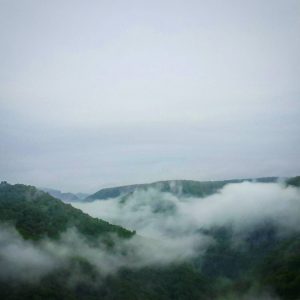Foggy Day Waterfowl – Calling Through the Mist
Foggy day waterfowl hunting can be very frustrating. You can’t see birds until they’re right on you, and you’re not sure if they can see your decoys. So, you call every once in a while, just in case something is flying nearby. Now and then, you swear you hear some whistling wings or the low nasally quack of a mallard drake, and you quickly throw a couple of quacks out into the white wall of fog.
How does that seemingly impenetrable white wall of fog actually affect the sound coming from your call? With low visibility, you’re relying on sound to pull the ducks in, so it’s important to know how the sound waves are traveling through the air.

Scientific Breakdown
“Fog is a visible mass consisting of cloud water droplets or ice crystals suspended in the air at or near Earth’s surface.” Thanks Wikipedia!
As sound travels through the air and encounters fog, some of the waves are absorbed by the water, causing attenuation of the sound. Other sound waves are refracted by the suspended droplets, causing refraction. So, as the sound moves through the fog, the sound waves are spreading out and being absorbed, meaning the sound will be quieter than on a clear day.
Low-pitch sounds travel better in fog than high-pitched sounds. This is why fog horns are really low-pitched. The high-pitch sounds are attenuated more due to their higher vibrations. A goose honk is a higher-pitch sound, and a duck’s quack is in the middle range of sound. So, both will experience some affect from the fog.
Fog can also have a direct impact on the temperature difference between ground-level and the air. Fog will prevent sunlight from reaching the ground, at least for a short time, meaning the ground-level temperature and the air temperature within the fog will be cooler. Referring back to our article on How Does Air Temperature Affect Calling, this means your call sounds will bend downwards toward the ground.
Adjusting Your Calling Style
Further Reading and References
There are other weather conditions which affect sound enough to change your calling style. Check out our other articles in the series “How Weather Affects Calling”, follow us on Facebook, and subscribe to our newsletter to receive our latest articles directly in your inbox.
References


